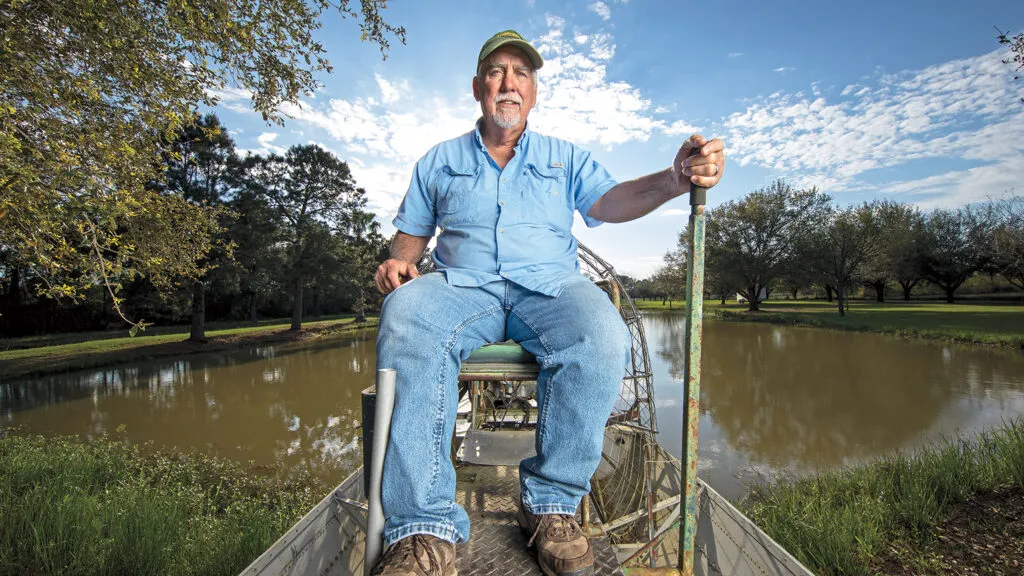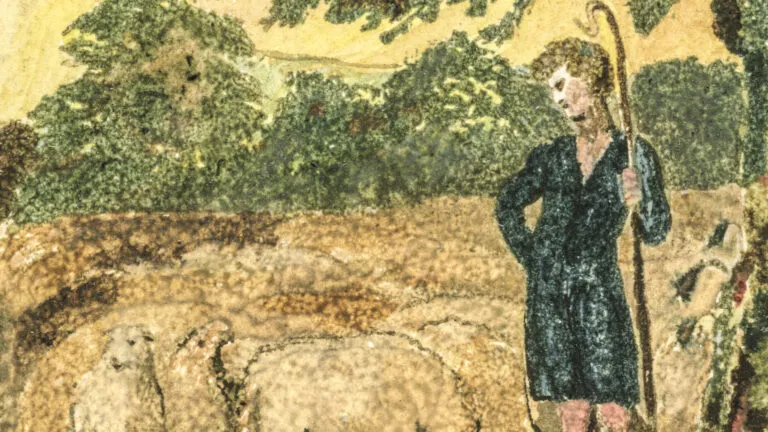Here in Texas, it takes an effort to control the alligator population. Texas Parks and Wildlife Department manages the population by having licensed people collect alligator eggs once a year. This is not an easy job.
I know because I did it part-time for years. I worked at a chemical plant and used my vacation time to go out in the marsh during alligator season.
One day in July of 2004, I was planning to collect eggs at Tigner Reservoir, which once provided water to irrigate rice fields. These days it was home to hundreds of alligators. I’d flown by helicopter to locate the nests, marking them in my GPS.
Collecting eggs is not a one-man job. I needed a right hand, so I asked my brother Paul to help me watch out for and distract mama gators while I was getting the eggs. He would use a long stick to tap them on the snout if they got too close.
Paul and I were raised to enjoy the marsh and what it had to offer. Our dad, Zack, was an avid trapper who’d gone alligator hunting with me many times before his death in January of 2004. I relied on him for much more than his outdoorsman’s knowledge. Before I ever made any big decisions, I would ask my mom and dad for their opinion. Besides the Lord, there was no one I trusted or admired more than my parents. With Dad gone, Paul was the natural next choice to come with me. He was seven years older than I was, and I’d always looked up to him. When we were growing up, he’d looked out for me. But out on the marsh, I was supposed to look out for him. I knew the area.
“I’ll buy you dinner after,” I said to Paul. “And by the way, it will be cool out there in the boat.”
“Done deal,” Paul said.
So we hooked up the airboat to the truck, packed it with crates for the gator eggs and headed out.
After a long drive, we arrived at Tigner Reservoir, just outside Angleton. Before we got in the boat, I called the game warden, Joe, to let him know we would be collecting some eggs in his county. I told him we had five or six nests to look at, then invited him to dinner with us when we finished up. This is going to be an easy day, I thought.
The first nest was easy. We drove the boat right up to it, carefully placed the eggs one by one in a crate and headed off to the next location. We harvested several nests and had two more to go. I followed my GPS coordinates and slowly pulled along the levee to the next spot. I walked three steps down the levee toward the nest. Paul was still in the boat, watching out for the mama alligator.
Suddenly, I heard Paul scream, “There’s bees!”
I continued harvesting the eggs, thinking it was just a few honeybees. I turned around to look, and a thick swarm of bees was swirling around Paul. He was swatting frantically. Those were not honeybees.
They were killer bees!
The loud noise of the airboat must have disturbed them when we came up.
I didn’t know much about those bees, but I knew enough to be scared. I had heard stories about Africanized killer bees coming up to Texas from Mexico. These hives must have been filled with thousands of ultra-defensive insects.
Then I realized the boat engine had stopped. I don’t know how. It was an airplane engine that had to cool for about 30 minutes before restarting. I thought, We’re trapped.
By then the bees were stinging me, thousands of sharp pricks all over my body. I felt like I was on fire! I yelled to Paul, “Jump in the water!”
He hesitated and said, “What about the mama gator?”
“Forget the gator,” I said. “There’s only one of her!”
Paul jumped out of the boat, and we headed into the water. So did the bees, fiercely stinging and continuing to swarm. The water was only about a foot deep, but the mud was up to our bellies. There was no way to swim or get into deeper water to escape the bees. The only thing we could do was trudge through the mud. Paul pulled his shirt up to protect his head. The bees swarmed his back. I swiped my hands across his back, crushing as many bees as possible.
I said, “Get lower in the water.”
The bees kept coming. I scraped them off my face and squashed them between my hands. We were scooping hundreds of bees off our faces. This is not good, I thought. We are going to die out here, and our funerals will have closed caskets because we’re going to look so ugly. Then I thought, I’ve lived a good life on this Earth. If it’s my time, it’s my time. But I didn’t want this to happen to my brother!
Out of nowhere, I heard a voice: “Boy, you have to get y’all out of here. It’s going to hurt, you’re going to be sick, but you have to drive that airboat. Get you and your brother out of here.” It sounded just like my dad. I’d know that no-nonsense tone anywhere. I’d listened to it all my life.
I took a deep breath and reached into the water. I grabbed a lily pad and put it over my head to try to keep the bees off. I started walking, trudging through the mud and water toward the boat. It wasn’t far away, but it seemed to take forever to get there and I was getting stung more and more.
I crawled into the boat and hit the starter. Nothing. The engine hadn’t had enough time to cool off. I hit it again. Still nothing. “Come on,” I said. I hit it a third time. The engine fired up. “Yes, thank you, Lord!”
I gave the engine some gas as the propeller sucked the bees away from my body like a giant vacuum cleaner. Where was Paul? I looked around and saw him by the levee, moving sluggishly toward the boat and slapping bees. I eased up beside him, and he crawled into the boat. The whirling propeller sucked the bees off him too.
“You okay, brother?” I asked. My face felt stretched like a rubber band, and my eyes were nearly swollen shut.
“I’m okay,” said Paul, “but you look ug-g-gly!” With that, I knew that he was going to be fine.
I turned the boat toward the truck and drove full speed ahead. I needed to call Joe, but I had lost my phone somewhere in the muddy water. Paul’s phone was in the truck. I grabbed it and called Joe, who was already on his way to meet us. I told him what had happened.
When he arrived, Joe took one look at us and said, “I’m taking y’all to the hospital.” He sped the whole way. I was already sick from all the beestings. The EMTs took Paul and me straight to the ER, where the nurses and doctors removed our clothes to access the beestings. I don’t think they had ever seen anyone come in such bad shape from beestings.
I was freezing and burning at the same time. The nurses started removing the stingers. I must have passed out. I could see my body lying on the bed, twitching and jerking as they worked, and I was thinking how bad I looked. When I came to, I heard the nurses talking about taking out more than 45 stingers from the top of one of Paul’s ears! The nurses used credit cards to scrape out the stingers, and carefully separated our hair to try to remove as many as possible. The stingers were mounding up on trays. Someone gave me morphine for the excruciating pain. At one point, a nurse pulled two dead bees out of my ear, and a third flew out and buzzed around the room. The nurses screamed. I couldn’t help but chuckle, thinking, All that yelling for one little bee?
We spent that night in the hospital and were released the next day.
It was a while before I told anyone about the voice I’d heard. The first person I told was my mother, Margie. She carefully listened. She thought I needed to tell Paul.
When I did, Paul didn’t say much. He just looked at me and nodded. Then he joked, “I wonder why Dad didn’t talk to me?”
I think maybe it’s because the Lord knew that out in the marsh, this younger brother needed to look out for his older brother. He spoke to me in the one voice he knew would get through to me, the one voice I would trust without question. My dad’s voice.
For more inspiring stories, subscribe to Guideposts magazine.





